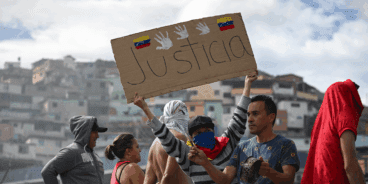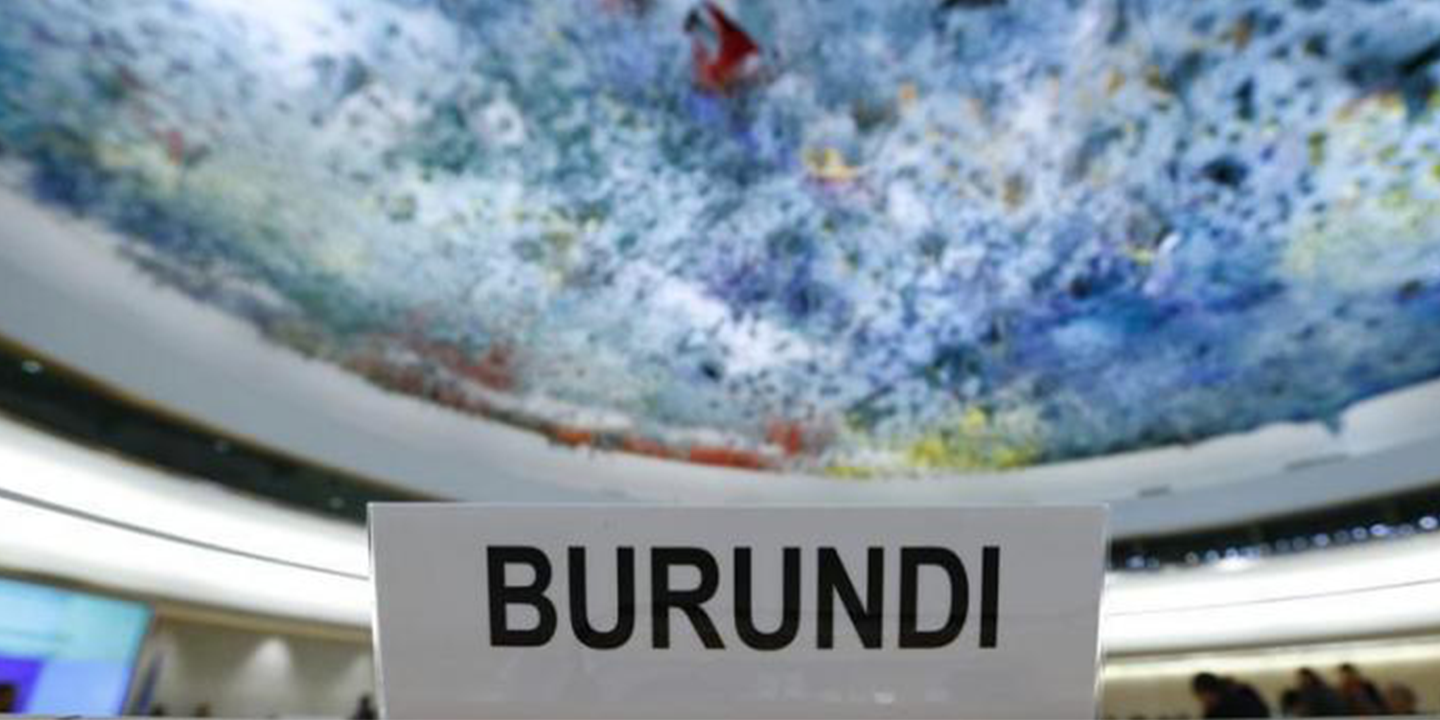

Burundi: Extend the Special Rapporteur’s mandate
To Permanent Representatives of Member and Observer States of the United Nations (UN) Human Rights Council (Geneva, Switzerland)
Excellencies,
At the 48th session of the UN Human Rights Council, in October 2021, the Council established a special procedure on Burundi. The new Special Rapporteur mandate includes critical monitoring, reporting, and technical advice components. The Council’s decision to discontinue the mandate of the Commission of Inquiry (CoI) at the same time ended the only international mechanism tasked with investigating violations and identifying alleged perpetrators of human rights violations and abuses in Burundi with a view to ensuring full accountability. In this context and amid serious ongoing human rights concerns, it is vital that the Special Rapporteur is able to fulfil his mandate.
The Special Rapporteur who was appointed in April 2022, Mr. Fortuné Gaetan Zongo, presented his first update to the Council in June 2022. As he is still in the early stages of his mandate, he expressed his willingness to explore avenues for cooperation with the Government of Burundi, while emphasising that significant efforts were still needed in many areas, including the fight against impunity, strengthening institutions overseeing justice, policing and military sectors, and the opening of civic space. Mr. Zongo is due to present his first written report at the Council’s 51st session (12 September-7 October 2022).
We believe that all components of the Special Rapporteur’s mandate can contribute to improving Burundi’s human rights situation. We stress, however, that the Special Rapporteur needs time to fulfill his mandate. Ahead of the Council’s 51st session, we urge your delegation to support the extension of the Special Rapporteur’s mandate for a further year to ensure that the Council continues its scrutiny and pursues its work towards justice and accountability in Burundi.
* * *
Pursuant to resolution 48/16, the Special Rapporteur has a mandate “to monitor the situation of human rights in Burundi, to make recommendations for its improvement, to collect, examine and assess information from all relevant stakeholders pertaining to the human rights in Burundi, building upon the work of the Commission of Inquiry, to advise the Government of Burundi in fulfilling its human rights obligations […] and to offer support and advice to civil society and to the National Independent Human Rights Commission [CNIDH].”
Since the Special Rapporteur’s mandate was operationalised, the human rights situation in Burundi has not changed in a substantial or sustainable way. The limited improvements since President Évariste Ndayishimiye was sworn in, in June 2020, as well as the positive signals he sent, particularly with regard to freedom of the press and promises of justice, have not materialised into long-term reforms.
All the structural issues the CoI and other human rights actors identified remain in place. These include arbitrary arrests of political opponents or those perceived as such, acts of torture and other cruel, inhuman or degrading treatment or punishment, enforced disappearances, extrajudicial killings, sexual and gender-based violence, undue restrictions to freedoms of expression, peaceful assembly and association, and violations of economic, social and cultural rights that are intertwined with the economic underpinnings of the State.
Independent national and international human rights organisations are still unable to operate in Burundi. Several of the country’s most prominent human rights groups remain either suspended or outlawed since 2015. Lawyer and former human rights defender Tony Germain Nkina remains in detention after the Court of Appeal of Ngozi upheld his conviction on politically-motivated charges linked to his human rights work and five-year prison sentence. Many human rights defenders and journalists remain in exile, twelve of whom have been convicted in absentia and sentenced to life imprisonment, as announced by Burundi’s Supreme Court in February 2021.
Serious violations continue, including those that previously led the CoI to conclude that crimes against humanity may have been committed. Impunity remains widespread, particularly relating to the grave crimes committed in 2015 and 2016. Police and security forces, the National Intelligence Service (SNR), and the Imbonerakure (the ruling CNDD-FDD party youth wing) are responsible for most of these violations.
In February 2022, Burundian human rights organisations highlighted that “no significant progress had been seen in terms of human rights in the country,” pointing to the absence of human rights reforms. “The situation we fled remains the same today,” they added, asking in the words of one defender: “How could we go back to a country where one is at risk of being abducted, arbitrarily arrested, or murdered ?”
* * *
The Council’s approach should rely on benchmarks to measure tangible progress, based on key indicators identified by the CoI. Doing so, the Council will acknowledge that any substantive change to its consideration of Burundi’s human rights situation will come as a result of demonstrable and sustainable progress on key issues of concern. The Council should also take into account risk factors of further violations.
The Government of Burundi continues to reject Council resolutions, refuses to meaningfully cooperate with UN human rights bodies and mechanisms, and has explicitly refused to cooperate with the Special Rapporteur.
The Government of Burundi should acknowledge existing human rights challenges and grant access to and cooperate with independent bodies and mechanisms. These include the Special Rapporteur, the Office of the UN High Commissioner for Human Rights (OHCHR), which closed its country office in 2019 at the request of the Government of Burundi, and the African Commission on Human and Peoples’ Rights (ACHPR), which urged the Government of Burundi to cooperate with all international stakeholders, including the African Union, the UN, and the East African Community.
The renewal of the Special Rapporteur’s mandate comes at a critical time, as ruling party leaders have been mobilising the Imbonerakure. As has been the case in the run-up to past elections in Burundi, the political repression is likely to worsen in the coming year. As the only international mechanism with a specific mandate to monitor the human rights situation in Burundi, it will be crucial for the Special Rapporteur to be able to report to the Council on violations and abuses during the upcoming period, including monitoring possible harassment and other violations targeting opposition members and supporters by the Imbonerakure.
In the absence of structural improvements and as grave human rights violations and abuses continue to be committed with impunity, the Council should adopt a resolution that reflects realities on the ground and ensures continued monitoring, reporting, and public debates on Burundi’s human rights situation. It should grant the Special Rapporteur the time he needs to fulfil his mandate and urge Burundi to cooperate with him, including by granting him access to the country.
At its 51st session, the Council should adopt a resolution that extends the mandate of the Special Rapporteur on Burundi for a further year.
We thank you for your attention to these pressing issues and stand ready to provide your delegation with further information as required.
Sincerely,
- Action des Chrétiens pour l’Abolition de la Torture – Burundi (ACAT-Burundi)
- African Centre for Democracy and Human Rights Studies (ACDHRS)
- African Centre for Justice and Peace Studies (ACJPS)
- AfricanDefenders (Pan-African Human Rights Defenders Network)
- Amnesty International
- Association Burundaise pour la Protection des Droits Humains et des Personnes Détenues (APRODH)
- Burkinabè Human Rights Defenders Coalition (CBDDH)
- Burundian Coalition of Human Rights Defenders (CBDDH)
- Burundian Coalition for the International Criminal Court (CB-CPI)
- Burundi Human Rights Initiative (BHRI)
- Cairo Institute for Human Rights Studies (CIHRS)
- Central African Network of Human Rights Defenders (REDHAC)
- Centre for Civil and Political Rights (CCPR-Centre)
- CIVICUS
- Civil Society Human Rights Advocacy Platform – Liberia
- Coalition Béninoise des Défenseurs des Droits Humains (CDDH-Bénin)
- Collectif des Avocats pour la Défense des Victimes de Crimes de Droit International Commis au Burundi (CAVIB)
- Consortium of Ethiopian Human Rights Organizations (CEHRO)
- DefendDefenders (East and Horn of Africa Human Rights Defenders Project)
- Ethiopian Human Rights Defenders Center (EHRDC)
- FIDH (International Federation for Human Rights)
- Forum pour le Renforcement de la Société Civile (FORSC)
- Geneva for Human Rights – Global Training (GHR)
- Gender Centre for Empowering Development (GenCED) – Ghana
- Global Centre for the Responsibility to Protect (GCR2P)
- Human Rights Defenders Network – Sierra Leone
- Human Rights Watch
- INAMAHORO Movement
- Independent Human Rights Investigators – Liberia
- International Bar Association’s Human Rights Institute (IBAHRI)
- International Commission of Jurists (ICJ)
- International Federation of ACAT (FIACAT)
- International Service for Human Rights (ISHR)
- Ivorian Human Rights Defenders Coalition (CIDDH)
- Lawyers for Justice Sudan
- Lawyers’ Rights Watch Canada
- Liberia Coalition of Human Rights Defenders (LICHRD)
- Light for All
- Ligue Iteka
- Malawi Human Rights Defenders Coalition
- Mozambique Human Rights Defenders Network (RMDDH)
- National Coalition of Human Rights Defenders in Kenya – Defenders Coalition
- Network of the Independent Commission for Human Rights in North Africa (CIDH Africa)
- Nigerien Human Rights Defenders Network (RNDDH/NHRDN)
- Partnership for Justice – Nigeria
- Protection International Africa
- Réseau des Citoyens Probes (RCP)
- SOS-Torture/Burundi
- Southern Africa Human Rights Defenders Network (Southern Defenders)
- Togolese Human Rights Defenders Coalition (CTDDH)
- Tournons La Page
- Tournons La Page Burundi
- TRIAL International
- West African Human Rights Defenders Network (ROADDH/WAHRDN)
- World Organisation Against Torture (OMCT)
Related Content


Atrocity Alert No. 445: Sudan, Syria and Eritrea
